Vehicle tracking system: make better decisions faster with GPS
Optimise your operations and reduce costs with real-time vehicle tracking






Webfleet' vehicle tracking software and fleet tracking solutions deliver the real-time location of every vehicle in your fleet. This allows you to adapt quickly to new developments and make smart, informed decisions.
Our vehicle tracking tells you which employee is closest to any new assignment as well as giving you instant access to important vehicle information and driving behaviour information such as speeding or harsh braking. Vehicle tracking can save you money and make your business more efficient. Find out everything you need to know about vehicle tracking here.
Explore our vehicle tracking solutions
Truck tracking
Truck tracking
Know the position and status of your fleet for more efficiency,with the highest data security
Van tracking
Van tracking
Improve fleet performance with precise location tracking combined with critical vehicle data
Car tracking solutions
Car tracking solutions
Enhance your fleet visibility with car tracking
Assets
Assets
Monitor your vehicles and assets on one interface
Powered assets
Powered assets
Monitor your machinery and powered equipment
Trailers
Trailers
Proactive monitoring and reporting with Webfleet Trailer
Discover our alternative tracking method
Dashcam tracking
Dashcam tracking
Get full insight into critical road events with our AI-powered dashcam and GPS tracking
Mobile app tracking
Mobile app tracking
Track your vehicles and digitise your workflow with a simple Android app
OEM tracking
OEM tracking
Connect your vehicles with factory-fitted telematics (no extra hardware required)
Why vehicle tracking?
Always know where your vehicles are, in real-time.
Get proof of delivery and provide insight on time spent at a customer.
Identify where to make savings by comparing previous trips.
Increase transparency to your customers by providing precise ETA's.
Respond quickly to customer emergencies by sending the driver with the quickest estimated arrival time.
Save admin time and be tax compliant with mileage registration.
Key features
Real-time vehicle tracking
Whether your drivers are parked or on the move, get their precise, mapped location with Webfleet. This can help with proof of delivery and allows you to monitor working-time guidelines compliance.
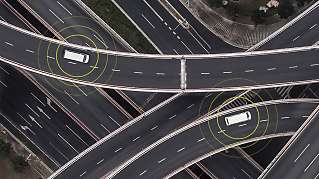
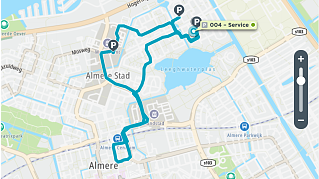
Informative tracking and tracing
Identify where to make savings by tracing previous trips. Our vehicle tracking system accurately records hours worked or hours spent behind the wheel and remembers where each vehicle in your fleet has been for up to 90 days in the past. This feature of the fleet tracking and vehicle tracking system provides an instant overview of vehicle movements, highlighting anomalies and exposing patterns in your business.
Instant, direct alerts
Webfleet provides alerts instantly when a vehicle enters or leaves a previously designated area or nominated geo-zone. These notifications are based on precise GPS, so you can know your vehicle locations at all times.
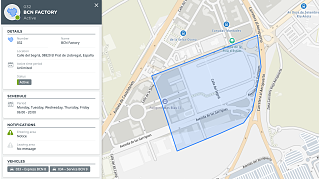
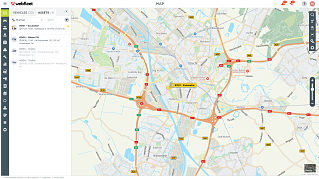
Maps
Choose between TomTom maps with extremely accurate traffic information, Google maps including street view or satellite maps and customise your fleet tracking.
Get insights on fuel and battery usage
Analyse and measure your fleet's fuel energy consumption over time, with graphs to visualise where you can optimise vehicle and driver performance for less environmental impact. Do you manage a fleet with EVs? Webfleet displays current power levels and remaining driving range by tracking battery level and range for all your electric and plug-in hybrid vehicles. Learn more about fuel consumption report and battery level tracking.
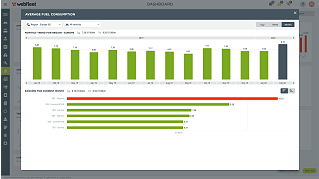
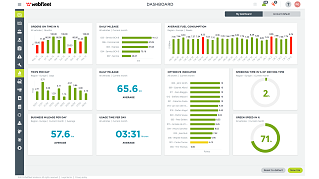
Dashboards and customized reports
Improve productivity by analysing driver data. Get access to an extensive set of dashboards and customised reports on driving hours, driving events, working time, trip reports and much more with the Webfleet vehicle tracking system.
Read moreAlways know who’s driving
Gain driver-focused insights by digitally recording your driver's check-in and check-out times. With vehicle tracking by Webfleet, you'll always know which drivers sit behind the wheel and how much time they spend on the road or on-site with customers, helping you stay compliant with drivers' hours regulations.
Learn more about driver identification
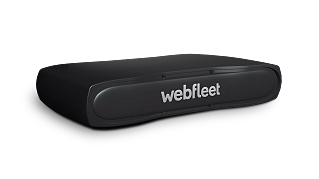
Monitor driving styles
The LINK GPS vehicle tracking system detects acceleration and abrupt movements such as harsh braking and over steering, along with current speed and speeding. With these insights available in Webfleet, you can identify which driving behaviours push up your fuel bill and take action to implement more efficient driving styles. Make fleet management easy with the help of our GPS vehicle tracking system.
Manage your fleet operations on the go
You don't need to be at your desk to manage your fleet. With Webfleet Mobile, it's all right there in the palm of your hand.
Features:
- Real-time vehicle and asset tracking
- Two-way communication
- Trip management
- Dispatch new orders and jobs
- Notifications and alerts

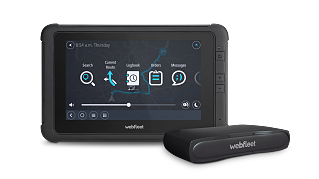
Enhance GPS vehicle tracking systems
For an enhanced GPS vehicle tracking system, just add one of our PRO Driver Terminals or Work App, our mobile workflow manager. These tools enable two-way communication with the office for easier time management and job dispatch. They also connect to the LINK unit using Bluetooth, letting drivers know when they need to change their driving style through active driver feedback.1 Both solutions provide you with full navigation*, including accurate traffic information.
All you need to know about vehicle tracking
What is vehicle tracking?
0
What is vehicle tracking?
0Vehicle tracking works by combining automatic vehicle location programming with software that is able to collect and maintain said data. Its triple function of acquiring, storing and, ultimately, processing location data allows trackers to get a vivid understanding of where a vehicle is located, all in real time.
By delivering real-time fleet tracking and historical locations of the cars, vans or trucks in a business’ fleet, vehicle tracking solutions help the fleet manager to both manage their workflow effectively in the moment and take better informed action to improve it in future.
How does GPS vehicle tracking work?
0
How does GPS vehicle tracking work?
0Vehicle tracking operates through global positioning systems, or GPS. To start, vehicles are outfitted with hardware devices that serve as receivers for important satellite signals. Layperson vehicle tracking may not require anything more than a smartphone, while other vehicle tracking systems could involve an installation of some kind.
The GPS-enabled device remains in constant communication with the satellite while the vehicle is in motion. In addition to including information about the specific location of a vehicle, many tracking systems can relay other key data points, such as direction and speed.
Our GPS vehicle tracking system links your fleet to the back office, enabling you to analyse tracking data. From your Webfleet dashboard, it’s easy to locate your vehicles, manage job dispatching and understand how driving styles influence your fuel efficiency.
How does GNSS vehicle tracking work?
0
How does GNSS vehicle tracking work?
0A GNSS vehicle tracking system relies on a receiver inside a vehicle's tracking device, which processes signals transmitted by satellites in space. Using these signals, the system can accurately determine the vehicle's location, including its latitude, longitude, direction and speed. A passive GNSS vehicle tracking system records this data and stores it locally, allowing it to be downloaded later for analysis. In contrast, an active GNSS vehicle tracking system transmits the information in real time to a centralised database for live monitoring and tracking.
What is a GPS vehicle tracking system?
0
What is a GPS vehicle tracking system?
0Vehicle tracking by GPS works just as the name suggests. Using a global positioning system, users are able to monitor fleet vehicle locations as it relates to their geographical location.
Depending on the nature of the device, the registered information may be stored internally or broadcast in real time to a cooperating fleet tracking programme. Some GPS trackers use cellular data (such as those found in most contemporary smartphones), while others use satellite signals to store and project the information.
Satellite-managed GPS vehicle tracking systems require no phone service to provide real-time updates. Consequently, they are well-equipped to handle more challenging routes in which acquiring a signal is a rare and unlikely occurrence. In either case, however, GPS systems are dependably accurate.
Why use a vehicle tracking system for your fleet?
0
Why use a vehicle tracking system for your fleet?
0When it comes to fleet management, the benefits of a vehicle tracking system are many. Vehicle tracking allows fleet managers and supervisors to know where their drivers and cargo are at all times—a very helpful feature for handling unexpected situations and a powerful tool for ensuring some of a business’ most valuable resources are kept secure, safe and in good condition.
Vehicle tracking systems can also help you set more accurate estimated times of arrival, particularly if the solution you are using offers accurate traffic information. With that functionality, you can adapt to unexpected jams and alert your driver to alter their route.
A reliable vehicle tracking system can also provide proof of delivery, if required, while also giving you insights into how much time is being spent with customers.
Driver communication and performance evaluation are both also improved by vehicle tracking. For example, a fleet tracking solution could provide insight into how drivers are behaving behind the wheel that can be a good basis for focused coaching and improvements.
Vehicle tracking can also help with route planning. It could provide insights on how to select faster, more efficient routes in future, or guarantee that drivers are remaining within compliance as it relates to laws dictating how many hours they are permitted to work consecutively in a single shift.
In short, the service allows a level of fleet tracking oversight never before realised by legacy technologies.
What are the benefits of a GPS vehicle tracking system for fleet tracking and tracing?
0
What are the benefits of a GPS vehicle tracking system for fleet tracking and tracing?
0A GPS vehicle tracking system offers several benefits for fleets:
- Optimised route planning for increased efficiency and productivity
- Greater accuracy of service times, leading to more satisfied customers
- Real-time visibility of vehicle locations, which can help prevent theft or unauthorised use
- Performance insights that support operationsal efficiency and profitability
- Reduced administration time thanks to less paperwork and fewer phone calls to drivers
Tracing previous trips your vehicles have made is a great way to identify where savings can be made and greater levels of efficiency can be created in your workflow. A reliable vehicle tracking system will accurately record hours worked and hours driven. Users can also see the historical position of their vehicles, in some cases going back as far as 90 days in the past.
With this information, you can better assess how your fleet is performing and how your resources are being utilised. Patterns and anomalies can be identified in how your vehicles move day to day, so you can make intelligent choices as to how to improve.
How to link vehicles to the office with a GPS vehicle tracking system?
0
How to link vehicles to the office with a GPS vehicle tracking system?
0Every in-vehicle tracking system is equipped with an integrated GNSS receiver that seamlessly transmits location data to your fleet management system. A solution like Webfleet makes it possible to monitor all your vehicles in real time. Location updates are refreshed every minute, providing the relevant insights you need to make informed operational decisions.
How much does vehicle tracking cost?
0
How much does vehicle tracking cost?
0How much vehicle tracking costs strongly depends on the type of plan that you select. Things like the number of vehicles you wish to track will impact the overall cost of your vehicle tracking solution.
However, while there are certainly costs built into adopting a vehicle tracking system, there are also savings associated with the service as well. For example, performance improvements linked to increased oversight may save fleets money on mileage, time and other expenses that are associated with underwhelming efficiency.
What is vehicle tracking software?
0
What is vehicle tracking software?
0Vehicle tracking software helps fleet operators track their whole fleet of vehicles, down to an individual truck or van. Such software can be used as a comprehensive fleet management solution, since it provides all the data needed to run a business efficiently. Fleet managers can, for example, stay on top of maintenance schedules as much easily as monitoring vehicle locations.
How does vehicle tracking software work?
0
How does vehicle tracking software work?
0Vehicle tracking software enables businesses to analyse their fleet data effectively. It processes your vehicle location data and driver behaviour information, making it available to your fleet management applications. Vehicle tracking software works in real time, so you can draw accurate insights about your operations 24/7.
Choose the best vehicle tracking solution for your business

Download guide to vehicle telematics

What is vehicle telematics and what are the benefits?
What our customers say
Dennis Evans, Sanctuary Maintenance25% savings in 2 months.
John Conway, Devon FreewheelersSaving Lives with Webfleet for Devon Freewheelers.
Pamela Dennison, W.S. DennisonReduced fuel & CO by 15%.






Return on investment within 6 to 9 months
Schedule a demo to understand how Webfleet can help your business or speak to a specialist who will answer any question regarding our solutions.






1For WorkApp, TomTom GO Fleet is required for enhanced professional navigation and active driver feedback
Your consent is required
In this section, external content is being embedded from .
To display the content, your consent is required for the following cookie categories:
- Targeted Advertising
- Analytics & Personalization
- Essential
For further details, please refer to our privacy policy. If you are interested in how ###vendor_name### processes your data, please visit their privacy policy.














